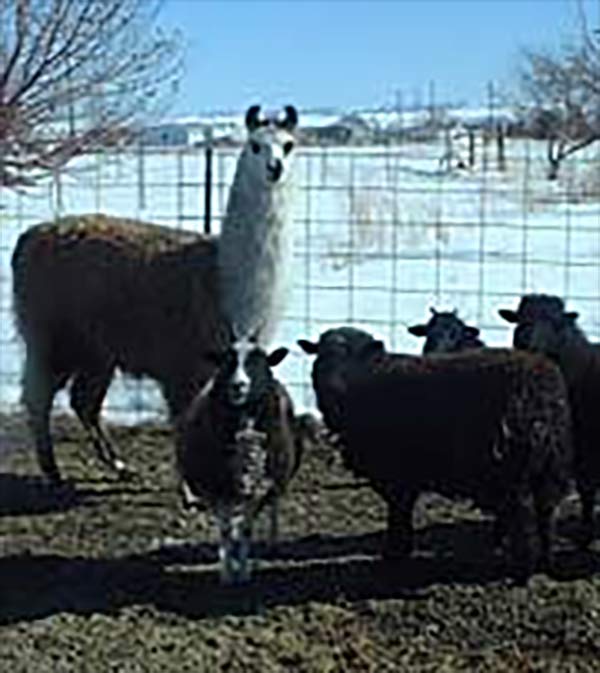A Match Made In Heaven

A true story ...a llama guarding sheep
One day I had a call from a 70-year-old lady who lives on a sheep ranch. She said that there are two things she has always wanted ... a 4-wheel drive pick-up and a llama. Her husband said that was nonsense because they didn't need either. He died 6 months ago and now she has a Ford 4-wheel drive pick-up and was on the phone pricing out a llama.
Meka was not a show llama, nor friendly, nor woolly. In fact, he didn't get along with people or other llamas. The other boys in the field would pick on him and he always lost. He was definitely low man on the totem pole. He needed a new home.
I delivered Meka to the sheep ranch with the elderly lady with the pick-up truck late one evening. She was excited and her daughter and grandchildren were there for the big event. They tried to pet him, but Meka, being Meka, just danced away from them at the end of a firmly held lead. I released him into a corral where the sheep had been herded for the night. Coyotes are an ever-present threat to sheep in the high mountains of Colorado.
Would he spook the sheep or would the sheep spook him? Maybe Meka would jump the fence and if so, this trip would be a waste. Meka was mildly curious and the sheep were mildly cautious. So far it looked promising. The plan was for Meka to spend the night in the corral, then be released the next morning with the sheep into an 80-acre pasture. I left with my fingers crossed.
That was two years ago. The lady with her 4-wheel drive pick-up and a guard llama are doing well. She has not lost any of her flock to coyotes now that Meka is on the job. The pasture fence is along a major highway and he keeps his flock safely away from the fence. If a perceived threat approaches (stray dog, coyote, etc.), he will position himself between the intruder and his herd.
Every night, when the lady comes out at 7:00 p.m. to open the gate to the corral, Meka will herd the sheep in. He's become her only ranch hand, a friend, and a guard llama with a purpose.
Llamas have a strong herd instinct and they like being with others of their own species. After being taken from their llama herd and placed with the sheep, they will adopt the sheep as their new herd. Being the largest of that new herd, they become dominant and protective. This protective instinct really kicks in at lambing. The llamas will eat the same forage as the sheep do. If the sheep are wormed or vaccinated, be sure to include the llama.
Research has shown us that llamas are effective at guarding sheep 95% of the time. Losses due to coyotes or dogs dropped to zero on half of the sheep ranches with llamas. I feel that the llamas should be a castrated male at least 2-1/2 years old. Younger males will work as well but it may take them longer to become fully effective. Llamas suitable for guarding may be purchased for $500 to $1,200 (or less).
Like this article? Become a RMLA Member today!

